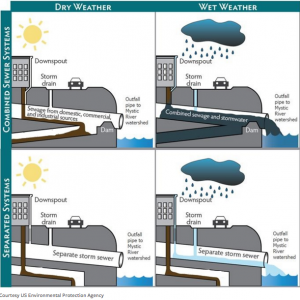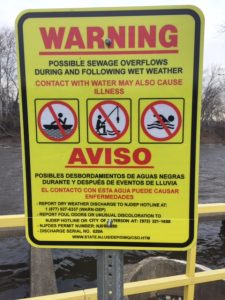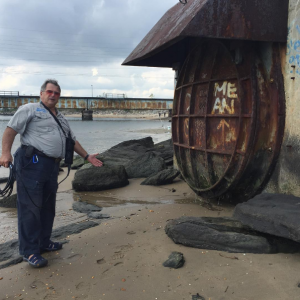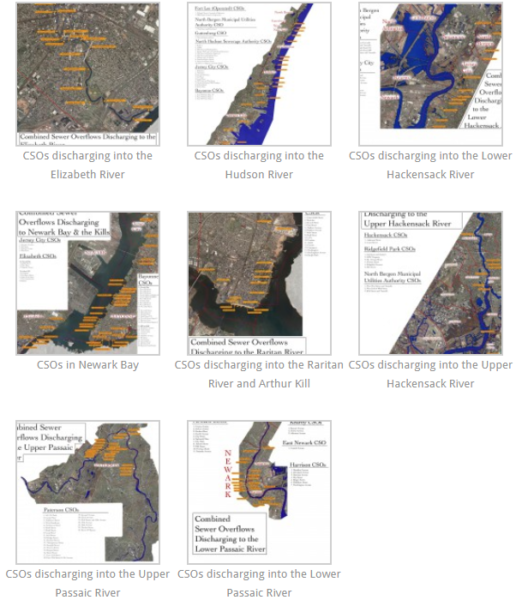Stormwater
Combined Sewer Overflows (CSOs)
Every year at least 24 billion gallons of untreated raw sewage are dumped into New Jersey’s rivers, mainly the Hudson, Passaic, Hackensack, Raritan, and Delaware rivers. As little as a twentieth of an inch of rain can send dangerous mix of bacteria and pollutants straight into many of New Jersey’s rivers.

How Raw Sewage Ends up in Your Water
A Combined Sewer Overflow (CSO) is an overflow of untreated sewage and stormwater into local waterbodies. How does this happen? Combined sewer systems are an outdated system used in older cities for collecting rainwater runoff and municipal and industrial wastewater/sewage and then transporting the water to a wastewater treatment plant. However, when it rains, the system becomes stressed. When it rains, the water volume in a combined sewer system can exceed the capacity of the system. When this happens, raw, untreated sewage is discharged directly to nearby rivers or other waterbodies. New Jersey has over 200 Combined Sewer Outfalls.

Risk the public – Raw sewage can carry bacteria, viruses, protozoa, intestinal worms, and fungi. Contact with these contaminants can lead to diseases ranging from mild gastroenteritis (the stomach flu) to severe water-borne illnesses such as cholera and dysentery. Residents may come in contact with contaminated water by means of kayaking, swimming, or fishing. For your safety, NY/NJ Baykeeper suggests avoiding contact with affected river water during and at least 72 hours after rainfall. If you have ever gotten sick from being in or near the water in New Jersey, email [email protected] with your story.

The NJ Department of Environmental Protection issued CSO permits to all 21 CSO municipalities in 2015. Permittees are working on Long Term Control Plans to reduce the amount of stormwater that flows into the Combined Sewer System. NY/NJ Baykeeper is working with the permittees to ensure that green infrastructure is part of this plan. More information about the permits can be found here. Dry weather discharges are a violation of the existing CSO permit and should be reported to Baykeeper and the DEP at 1-877-WARN-DEP.
Click here for our downloadable brochure on CSOs.
How Do I Know if It Is Safe to Go in the Water?
You don’t! The water is not always dangerous, but for the rivers (and beaches along Raritan and Newark Bay that are not official “swimming” beaches), there is no system to tell people when it is or when it is not safe to go in the water. In fact, the State of New Jersey does not even test these rivers and bays to determine whether or not they are safe. There are usually no signs showing people where the sewage enters the water and no warning system to tell people when the water is unsafe.
WHAT YOU CAN DO:
- Put off your chores when it rains! Conserve water during rainfall by putting off doing laundry and running the dishwasher. Our old water infrastructure is like rush hour…There’s only so much road and if everyone uses it at the same time, it can get jammed.
- Keep your own stormwater out of the sewage system by redirecting your downspouts to a grassy area, planting a rain garden, and installing a rain barrel. Urge your town to implement green infrastructure.
- If you’re on Facebook, join the group I Hate Combined Sewer Outfalls to discuss these issues and access information as it becomes available.
Links:
Click to read a Newark Star-Ledger article about CSOs in New Jersey.
Click to read our NY/NJ Baykeeper’s Policy Paper about Low Impact Design.
Click to read about CSOs in New York.
Click to learn about what New York City is doing to address CSOs.

Green Infrastructure
NY/NJ Baykeeper is actively involved with Newark DIG (Doing Infrastructure Green) and actively promotes Low Impact Design, or Green Infrastructure, to divert stormwater from sewer systems in order to reduce combined sewer overflows. Green infrastructure, such as rain gardens, rain barrels, green roofs, and other components, capture or slow down stormwater so that it can be reused, soak into the ground, or evaporate.
Baykeeper funded the design and capital equipment for a Low Impact Development project in a community garden in Newark that, for the first time, utilizes stormwater capture for on-site irrigation needs. Rainwater is collected from adjacent rooftops and pervious surfaces in the garden and stored in an underground cistern. The water is then hand pumped by local school children to water the plants and vegetables.
Greg Remaud, Baykeeper and CEO serves on the Advisory Board of Sewage-Free Streets and Rivers which works to empowers community organizations to engage residents and small business owners to shape the solutions to reduce localized flooding and the raw sewage dumped into our waterways.
Read more about Stormwater, CSOs and Green Infrastructure
Resources:
Stormwater-CSO-Green-Infrastructure_English_20141
Stormwater-CSO-Green-Infrastructure_Spanish_2014
Stormwater-CSO-Green-Infrastructure_Portuguese_2014
